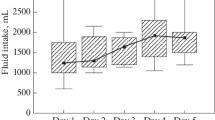Abstract
Background
To evaluate the relationship between hypobaric hypoxia acclimatization and intraocular pressure (IOP) during ascent, acclimatization, and descent between 2286 m and 5050 m.
Methods
The following acclimatization-indicative physiological parameters were compared daily with IOP changes in eight healthy climbers of the 2003 Greek Karakorum expedition in altitude stages between 500 m and 5050 m: hemoglobin oxygen saturation (PO2), resting heart rate, blood pressure, retinal findings, and the Lake Louise score for acclimatization grading.
Results
IOP decreased significantly in the ascent phase (0.58 mmHg/100 m) and recovered (0.71 mmHg/100 m) during acclimatization and descent. A direct proportional correlation between decreases in PO2 and IOP was evaluated. Arterial blood pulse and pressure increased during acclimatization, while IOP decreased. No retinal hemorrhages were observed in well-acclimatized and incompletely acclimatized climbers.
Conclusions
Every new active exposure to hypobaric hypoxia in the ascent phase induced a decrease in the IOP parallel to the PO2 decrease and to the level of acclimatization. The results from our study suggest that IOP changes are related to hypoxia-induced respiratory alkalosis and acclimatization stage, which could be used as a simple mobile screening test for acclimatization level to reveal acute mountain sickness and its severe consequences.




Similar content being viewed by others
Explore related subjects
Discover the latest articles and news from researchers in related subjects, suggested using machine learning.References
Appleton F (1967) Possible influence of altitude on blood pressure. Circulation 36 [Suppl 11]:35
Brinchmann-Hansen O, Myhre K (1989) Blood pressure, intraocular pressure, and retinal vessels after high altitude mountain exposure. Aviat Space Environ Med 60:970–976
Butler FK, Harris DJ Jr, Reynolds RD (1992) Altitude retinopathy on Mount Everest, 1989. Ophthalmology 99:739–746
Canepa A, Chavez R, Hurtardo A, Rotta A, Velasquez T (1956) Pulmonary circulation at sea level and at high altitudes. J Appl Physiol 9:328–336
Carapancea M (1977) Experimental and clinical hyperophthalmotony of high altitudes. Arch Ophthalmol (Paris) 37:775–784
Chatterjee SK, Chakraborty A (2001) Intraocular pressure changes and mountaineering—preliminary observations and possible application. J Assoc Phys India 49:248–252
Clarke C, Duff J (1976) Mountain sickness, retinal hemorrhages, and acclimatisation on Mount Everest in 1975. BMJ 2:495–497
Firsching R, Schutze M, Motschmann M, Behrens-Baumann W, Meyer-Schwickerath R (1998) Non-invasive measurement of intracranial pressure. Lancet 351:523–524
Frayser R, Houston CS, Bryan AC, Rennie ID, Gray G (1970) Retinal hemorrhage at high altitude. N Engl J Med 282:1183–1184
Frayser R, Houston CS, Gray GW, Bryan AC, Rennie ID (1971) The response of the retinal circulation to altitude. Arch Intern Med 127:608–611
Heath D, Williams DR (1981) Man at high altitude. Churchill Livingstone, New York, p 139 and p 187
Honigman B, Theis MK, Koziol-McLain J, Roach R, Yip R, Houston C, Moore LG, Pearce P (1993) Acute mountain sickness in a general tourist population at moderate altitudes. Ann Intern Med 118:587–592
Lehman RAW, Krupin T, Podos SM (1972) Experimental effect of intracranial hypertension upon intraocular pressure. J Neurosurg 36:60–66
Lempert P, Cooper KH, Culver JF, Tredici TJ (1967) The effect of exercise on intraocular pressure. Am J Ophthalmol 63:1673–1676
Lenfant C, Sullivan K (1971) Adaptation to high altitude. N Engl J Med 284:1298–1308
Lubin JR, Rennie D, Hackett P, Albert DM (1982) High altitude retinal hemorrhage: a clinical and pathological case report. Ann Ophthalmol 14:1071–1076
Marticorena E, Ruiz L, Severino J, Galvez J, Penaloza D (1969) Systemic blood pressure in white men born at sea level: changes after long residence at high altitudes. Am J Cardiol 23:364–368
McFadden DM, Houston CS, Sutton JR, Powles AC, Gray GW, Roberts RS (1981) High-altitude retinopathy. JAMA 245:581–586
Ng JD, White LJ, Parmley VC, Hubickey W, Carter J, Mader TH (1996) Effects of simulated high altitude on patients who have had radial keratotomy. Ophthalmology 103:452–457
Ortiz GJ, Cook DJ, Yablonski ME, Masonson H, Harmon G (1988) Effect of cold air on aqueous humor dynamics in humans. Invest Ophthalmol Vis Sci 29:138–140
Passo MS, Goldberg L, Elliot DL, Van Buskirk EM (1991) Exercise training reduces intraocular pressure among subjects suspected of having glaucoma. Arch Ophthalmol 109:1096–1098
Rennie D, Morrissey J (1975) Retinal changes in Himalayan climbers. Arch Ophthalmol 93:395–400
Viestenz A, Lausen B, Junemann AM, Mardin CY (2002) Comparison of precision of the TonoPen XL with the Goldmann and Draeger aplanation tonometer in a sitting and recumbent position of the patients—a clinical study on 251 eyes. Klin Monatsbl Augenheilkd 219:785–790
Wiedman M (1975) High altitude retinal hemorrhage. Arch Ophthalmol 93:401–403
Wilmer WH, Berens C Jr (1918) Medical studies in aviation: V. The effect of altitude on ocular functions. Aviat Space Environ Med 60:1018–1023
Author information
Authors and Affiliations
Corresponding author
Rights and permissions
About this article
Cite this article
Pavlidis, M., Stupp, T., Georgalas, I. et al. Intraocular pressure changes during high-altitude acclimatization. Graefe's Arch Clin Exp Ophthalmo 244, 298–304 (2006). https://doi.org/10.1007/s00417-005-1174-1
Received:
Revised:
Accepted:
Published:
Issue Date:
DOI: https://doi.org/10.1007/s00417-005-1174-1




